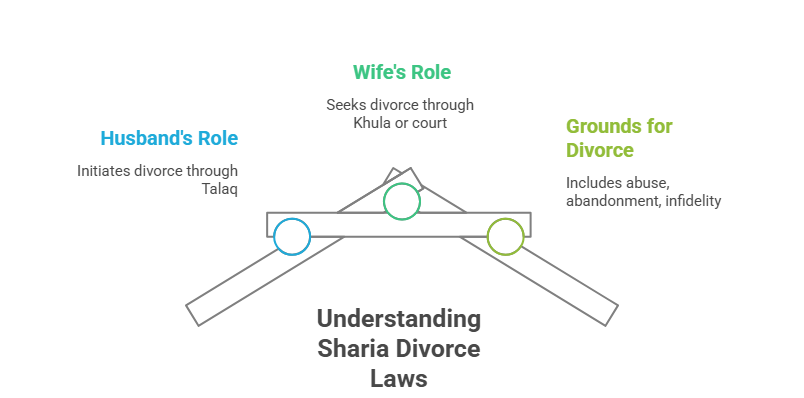
Table of Contents
Understanding Divorce Grounds in Qatar
Divorce in Qatar is controlled by Sharia law for Muslims and civil/personal status laws for non-Muslims. Whether you are a Qatari national, an expatriate, or of a mixed marriage religiously, an understanding of the rights, obligations, and legal divorce processes is essential. This comprehensive guide covers everything from grounds and procedures to documentation preparation and duties after divorce in Qatar.
Sharia-Based Grounds for Divorce
Under Islamic law:
Civil Grounds for Non-Muslims
Non-Muslim expatriates may seek divorce based on their own country’s laws through their embassy or via Qatar’s civil procedures when recognized. Civil divorce typically applies to same-nationality expat couples.
Mutual Consent and No-Fault Divorce
While Qatar does not formally recognize "no-fault divorce," mutual consent divorce is possible. In such cases, both parties agree to the separation terms and apply jointly at court.
Types of Divorce Recognized in Qatar
Talaq (Divorce by Husband)
The husband can unilaterally initiate divorce by saying “Talaq” three times. It must be reported to the court and officially documented to be legally binding.
Khula (Divorce by Wife)
A wife can initiate Khula divorce by offering to return her dowry or forgoing certain rights. The court must approve this request, ensuring there’s just cause.
Court-Initiated Divorce
If both Talaq and Khula are not agreed upon, the court can dissolve a marriage due to:
-
Marital disputes
-
Abuse or harm
-
Abandonment or imprisonment
Civil and Religious Divorce for Expats
Expats may follow their home country’s divorce procedures via their embassies in Qatar. Alternatively, they may file under Qatari law. Court recognition depends on document attestation and translations.
Step-by-Step Divorce Procedure
Filing for Divorce at Family Court.png)
Required Documents
-
Passports and QIDs of both parties
-
Marriage certificate
-
Children’s birth certificates (if applicable)
-
Financial documents (for asset division/support claims)
-
Affidavit of cause for divorce
Timeline and Costs
-
Typical divorce proceedings take 2–6 months.
-
Filing and court fees: QAR 200–500.
-
Legal translation and notarization may cost extra.
Attending Hearings and Receiving Judgments
-
Hearings are conducted in Arabic; an official translator may be required.
-
Both parties must be present or legally represented.
-
After judgment, parties receive a court-stamped divorce certificate.
Rights and Responsibilities Post-Divorce
Custody of Children
-
Generally granted to the mother for young children.
-
Fathers retain financial responsibility and visitation rights.
-
Court evaluates each parent’s ability to care for the child.
Spousal Support and Financial Settlements
-
Alimony may be awarded to the wife based on need and husband's income.
-
Duration and amount depend on marital duration and circumstances.
Property Division
-
Assets acquired during marriage are subject to court determination.
-
Qatar doesn’t enforce community property rules—each case is unique.
Women’s Rights Under Qatari Law
-
Women may request maintenance, custody, and fair financial settlement.
-
Divorce initiated by women (Khula) may require them to relinquish some rights.
Special Considerations for Expats
Embassy Involvement and Document Attestation
-
Divorce through embassies is recognized if documents are attested by Qatar’s Ministry of Foreign Affairs (MOFA).
-
Dual nationality or interfaith marriages may require additional steps.
Visa and Residency Implications
-
Divorce may affect a spouse’s residency permit if they are under dependent sponsorship.
-
In many cases, the individual must find new sponsorship or leave the country.
Recognition of Foreign Divorces
-
Qatar may recognize foreign divorce decrees only if:
-
They are legally issued.
-
Properly translated and attested by MOFA and the home embassy.
-
Religious Impact on Mixed-Nationality Divorce
-
Divorce rights may vary depending on religion (e.g., Islamic rulings may not apply to Christians).
-
Court may seek guidance from religious authorities for interfaith cases.
Legal Documentation and Translation
.png)
Legal Advice and Representation
When to Hire a Divorce Lawyer
-
Complex financial settlements
-
International custody disputes
-
Cross-religion or interfaith marriages
-
Disagreements about property or support
Top Law Firms for Divorce in Qatar
Look for firms experienced in:
-
Sharia law and family matters
-
Civil litigation for expats
-
Child custody mediation
Platforms like Lawyers 974 help you connect with top-rated, licensed divorce lawyers in Qatar.
Legal Aid and Consultation Services
-
Some embassies offer legal assistance or lists of recognized lawyers.
-
Free consultations may be available for low-income residents.
-
Always request a clear fee structure and agreement before hiring a lawyer.
Conclusion
Divorce in Qatar, whether for nationals or expatriates, involves a structured legal process governed by religious, civil, and national laws. The steps vary significantly depending on religion, nationality, and whether both parties consent.
It’s essential to understand your rights, prepare all documentation carefully, and seek legal representation when necessary. By doing so, you can ensure a smoother process and avoid costly delays or legal issues.
For expert legal guidance and reliable representation, consider reaching out to verified professionals through platforms like Lawyers 974, where legal experts in divorce and family law are just a few clicks away.
Empower yourself with knowledge, and take the next step with legal clarity.
Disclaimer: This article provides general information and should not be construed as legal advice. Please consult with a qualified and experienced lawyer for personalized guidance regarding your specific situation.

